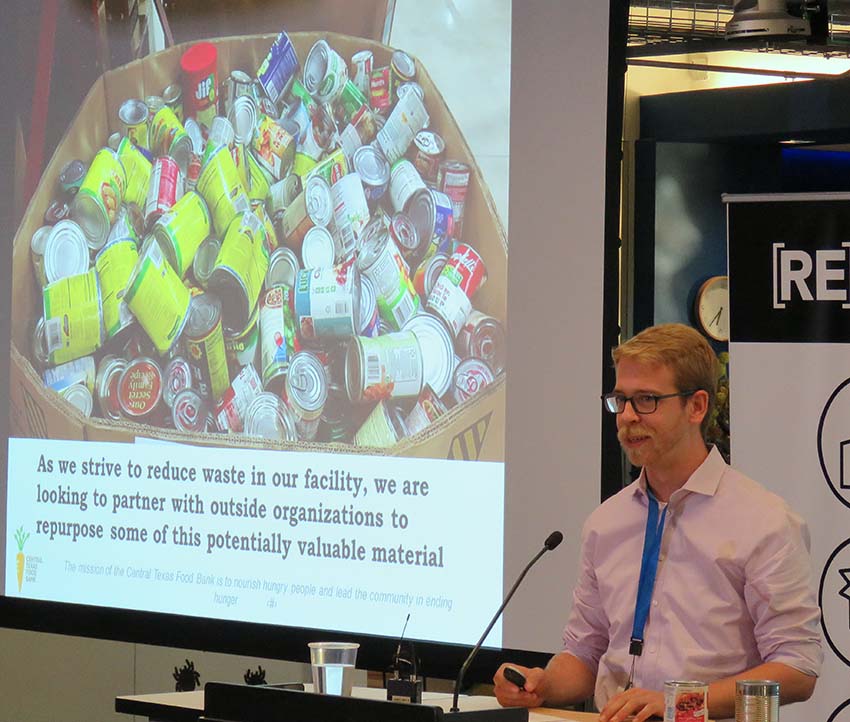Entrepreneurs are digging up new business models from an unusual place: other companies’ trash.
The [Re]Verse Pitch competition, which began Oct. 11, matches entrepreneurs with businesses and nonprofits currently throwing away unneeded materials, which the entrepreneurs will use to found new businesses.
“I heard about the competition through the McCombs school,” social work senior Jessica Stillwagon said. “I decided to enter because I’m just really interested in the idea of being profitable while also making a great social impact.”
At the opening event, hosted by the City of Austin Recycling Economic Development Program, six businesses pitched their materials, including fabric-sample books, plastic mesh bags and vinyl street banners. Chris Jones, as a representative for Half Price Books, offered unsellable items the store receives, such as damaged books, VHS tapes, CDs and cassettes, which fill up two dumpsters’ worth of space every week.
“You could do something really large scale if you had the right idea,” Jones said. “There’s just an enormous amount of all these things. There are a lot of plastics out there, very few of which have been tested for their environmental impact. It’s a crazy experiment to be dumping it all into landfills.”
Central Texas Food Bank pitched inedible canned food, including unlabeled or damaged cans, giving the competitors a wide variety of material to work with. According to the [Re]Verse Pitch website, the bank has to throw away 30,000 pounds of food per month.
Additionally, LiveStrong pitched outdated silicone wristbands.
“I thought the silicone bands were interesting,” Stillwagon said. “People were talking about melting them down and combining them into something else. I’m not sure what environmental impact that would have. There are a lot of cool things you can do [with the materials], but I want to make sure my idea doesn’t have any negative externalities.”
Moving forward, the competitors will work with mentors to develop their ideas and submit a final application by Nov. 18. Eight finalists will present their pitches to a panel of judges on Dec. 6. The best entry will receive a prize of $10,000 to start their business, while second place will earn a spot in the 2017 FastForward entrepreneur training program and a pass to the 2017 Small Business Festival.
Natalie Betts, recycling economic development liaison for the City of Austin, started the competition last year after being inspired by Austin Materials Marketplace, a similar project that connects businesses with waste material.
“It just occurred to me that so many people in Austin would love to know what’s out there,” Betts said. “Materials are just going straight from the store to the dumpster because no one knows it’s there. [Re]Verse Pitch was created to bring in people who would say, ‘I could do something with that.’”
According to Betts, 16 people submitted an initial proposal to [Re]Verse Pitch last year, but about 40 people are likely to submit one this year.
“I feel great about our growth,” Betts said. “The competition was something we put together [last year] not knowing if anyone would be interested. I’m really thrilled that the word is getting out. We may have to make some changes to accommodate the growth in future years.”
The winner last year, Brandon Ward, pitched an idea to turn brewery grain into a snack. His company, Brewnola, will soon sell its three flavors online.
According to Betts, [Re]Verse Pitch is helping Austin reach its goal of being a zero-waste city by 2040. However, she said there are still a number of steps to take before that goal is a reality.
“It won’t be easy, but it’s definitely doable,” Betts said. “There’s lots of challenges with getting people to recycle, but it’s technically feasible to do it today, and it’s only 2016. Ninety percent of our waste stream is either recyclable or compostable with existing technology.”















